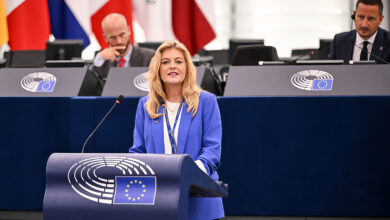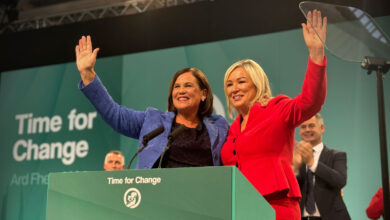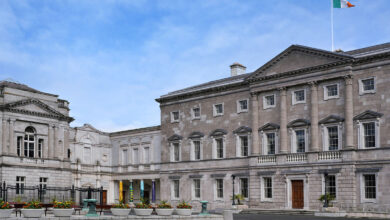Strictly speaking: Ceann Comhairle
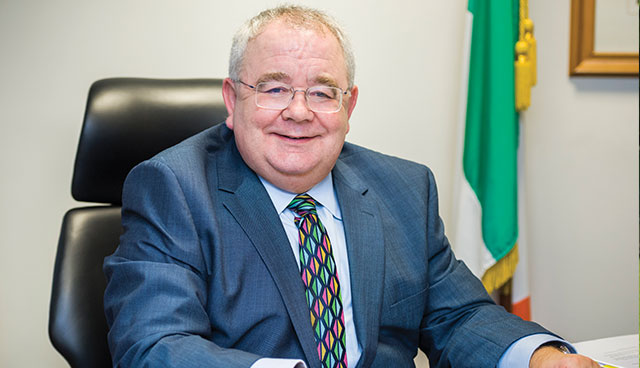

In 2016, Fianna Fáil TD Seán Ó Fearghaíl, a native of Newbridge, County Kildare, was elected as the 19th Ceann Comhairle of Dáil Éireann. Ciarán Galway visits Leinster House to explore the remit of the role within the current and unprecedented political context of the 32nd Dáil.
Since its inception in 1919, the status of Ceann Comhairle has always been significant. Viewed through a prism of the Dáil, it is a post that many individuals consider desirable. The role itself is multi-faceted in nature. The most obvious function is to chair sessions of the Dáil and to do so, Seán Ó Fearghaíl, the current incumbent emphasises, “in a positive and constructive way that is conducive to the effective conduct of business, maximising the throughput of legislation and the participation of the individual deputies in that whole process”.
A second function is more administrative in nature because the Ceann Comhairle chairs the Houses of the Oireachtas Commission, which is ultimately responsible for the overall management of the complex. “Remember, the budget here is around €123 million per annum, so it’s quite significant,” he emphasises. Thirdly then, there is a more diplomatic aspect to the role in that the Ceann Comhairle is the point of contact with most politicians or delegations who visit the Houses. “Protocol dictates that the Ceann Comhairle will meet them, have an exchange of views and very often act as a conduit to pass on issues that they may have in respect of various government departments,” explains Ó Fearghaíl.
There are a number of areas where the Ceann Comhairle has direct responsibility. For instance, Ó Fearghaíl acts as the Chairman of the National Council for Bravery Awards (Comhairle na Mire Gaile) is also Chair of the Public Service Appointments Commission (PSAC).
Within the life of the current Dáil, the role has developed very significantly and become more active. “One of the first things that this Dáil did was elect the Ceann Comhairle for the first time ever. Traditionally the Ceann was appointed by the Taoiseach of the day, but it was done by direct election and by secret ballot, which was an issue for some citizens who argued, ‘we elected our TDs so they shouldn’t be having secret ballots’,” Ó Fearghaíl notes. Indeed, at the time, his predecessor Seán Barrett criticised the process as being “against the spirit of openness in the chamber”.
The new Dáil also established a Committee on Dáil Reform, which again is chaired by the Ceann Comhairle. It has introduced a variety of changes to the conduct of business in the House. “Most significantly, it has moved the organisation of business away from the control of government and into the control of the Dáil as parliament,” he clarifies.
“Arising out of that reform process and in order to give effect to those sort of changes, the Dáil Business Committee was established, which I also chair and it meets on a weekly basis. It plans the work that the House will undertake on a weekly, fortnightly and session basis. It also seeks to ensure the smooth progress of legislation and that the various committees of the House are working on and progressing legislation that has been referred to them.”
Traditionally the role of the Ceann Comhairle was very isolated. This is perhaps best illustrated by the existence of a room in Leinster House known as the Ceann Comhairle’s Private Dining Room.
While not considering himself “a great crusader”, Ó Fearghaíl feels that the tradition was unnecessary and that ultimately, he would be judged on his objectivity in the chamber, rather than where he ate his dinner. “I probably am a bit more accessible than some of my predecessors and I engage with the members on a fairly continuous basis, but I have had to remove myself entirely from the party-political system. Sometimes it can be difficult to refrain from engaging in a debate, but when you remove yourself from the partisan position, you begin to see the merits that are sometimes present in the opposing arguments.”
New politics
Ó Fearghaíl maintains that it wasn’t particularly difficult to implement his own style in chairing Dáil sessions. “The thing about it was, we had an entirely new Dáil with a new beginning. To a large extent, the 2016 election was a watershed in that it threw up a hung-parliament, a minority government and a realisation on the part of politicians that we have to do things differently as a result of the decision that the people gave us.”
Rather than being more polarised, the Ceann Comahirle asserts that there are now clearer divisions between left and centre, as opposed to left and right equilibrium present in many European equivalents. As such, he found that he could fit fairly neatly into the new dynamic.
Suggesting that the chamber is not the bitter and acrimonious place that it once was, Ó Fearghaíl outlines: “I found that by talking to and engaging with the political groupings and their leaders, that they’ve come onboard pretty well. There would be the odd flare up, but a lot of the tension is gone and that relates to the change in political circumstance. I think that the language has, to a large extent, moderated as well. I can’t say that it’s a totally non-partisan sort of place, but the partisanship has been tempered.”
While chameleon nature of politicians, by virtue of the fact that they have to respond to the public mood, enables them to be much more amenable to change, it is harder for those in Government Buildings.
Ó Fearghaíl concedes elements of the civil service have been slow to adapt to this new dispensation. “The permanent government is often, by its very nature, conservative, careful and cautious about change. It continues to be fair to say that a proportion, probably a small proportion, but a proportion nonetheless, of key public servants continue to have some difficulties in adapting to the changed environment.”
“It continues to be fair to say that a proportion, probably a small proportion, but a proportion nonetheless, of key public servants continue to have some difficulties in adapting to the changed environment.”
Legislative process
One obvious outworking of the new political dynamic is that the minority government must be more deliberative and consultative in how it approaches legislation. A consequence of this requirement to tread carefully means that the Government will inevitably produce less legislation than a government with an overall majority. The consequence of a slower, more cautious process should be a higher quality of legislation.
One of the reform measures has ensured that the guillotine is no longer applied. “We have found, to our cost, that legislation that was guillotined through the House, on many occasions, turned out to be flawed and had to be revisited. So, the quality of what is going through now should be better,” states Ó Fearghaíl.
“There is also a process in place whereby many bills get what’s called pre-legislative scrutiny whereby it goes to the sponsoring committee, is looked at, is teased out and interest groups are given an opportunity to discuss it before it is progresses either to second stage or to committee and report stage.”
At the same time, there has been an exponential rise in legislation being produced by individual government backbench and opposition TDs. Up until 2011, opposition time tended to be taken up, in the most part, discussing motions. In 2011, however, the then government introduced a sitting every second Friday whereby private member’s bills could be considered. Yet, between 2011 and 2016, only two of the private member’s bills ever saw the light of day and were enacted as legislation.
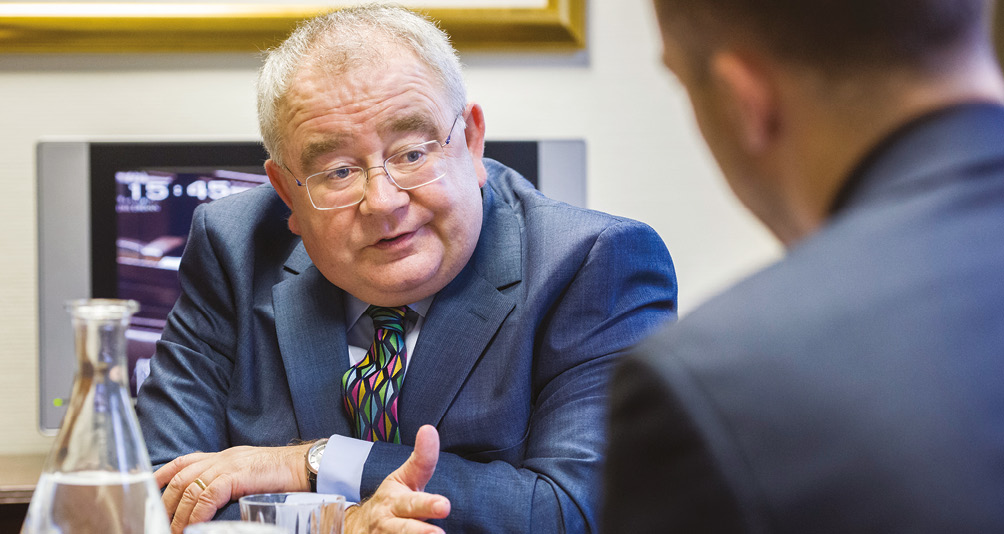
Latterly, there has been “an explosion” in this type of legislation since 2016, owing to the minority position of the Government and because opposition TDs have an enhanced chance of getting legislation through the House. Publicity also plays a role in this proliferation and the Ceann Comhairle highlights: “There is a device here whereby once you publish a bill you can introduce it in the House and stand up to talk about it for five minutes. If you’re a country deputy, for example, your local radio station will probably bring you on and interview you about the bill that you produced. If it’s a really interesting issue of some national significance, maybe the national press will pick up on it.”
As a result, in recent months, there have been efforts to develop the existing parliamentary legal office in order to support deputies to produce high quality legislation. “We are employing drafters, which we never had before here in the Oireachtas, to support members in drafting legislation. If a bill comes from the Government, it comes from the Government having gone through the Attorney General’s Office and having been legally proofed, then it goes before the Parliamentary Draftsman. Previously, there wasn’t the corresponding process on the other side and we’re trying to put that in place.”
Public perception
The relationship between the Dáil and citizens is a key priority for Ó Fearghaíl. “We have an open-parliament policy, we encourage the public to visit here, we encourage their engagement through social media, we have had two public seminars: one on Brexit and one on mental health. Similarly, Oireachtas TV is a major part of our strategy and it broadcasts 24/7. It’s surprising the number of people who tune in and watch it.
“Parliament aside, there is another issue about how politics relates to the public and how the public relates to politics. Particularly since the recession, I think that there is a high level of cynicism and a sense among the public that politicians are a kind of ‘élite’, removed from them. This is true, not just in Ireland but across many parts of the developed world, where traditional political parties have become comfortable, complacent and removed from the people.” Within the political system, the Ceann Comhairle contends, there is a need to recognise that street politics, whereby politicians are involved in the community, meeting people and being accessible to them on a continuous basis “ultimately affords a politician the best opportunity to do their job”.
On issues of public controversy, he maintains that they should be “approached with an open mind whereby people seek out all available facts and avoid making judgements without all the facts”. At the same time, Ó Fearghaíl outlines: “If we were to have learned anything from the economic collapse it was that we didn’t listen to the people who rang the alarm bells. We didn’t listen to the people who questioned what we were doing. We should always listen to the naysayers, we shouldn’t simply dismiss them out of hand and we should always be prepared to hear the contrary view and weigh it in the balance.”
Dáil privileges
With two cases currently on appeal to the Supreme Court, the Ceann Comhairle suggests that there has been an increasing incidence of members making statements in the House that sail very close to the edge in terms of the constitutional provision on privilege. “If you read the judgements, while the Oireachtas won the two cases in terms of Kerins and O’Brien, the courts were critical of how some of the business was transacted here. Upon reading those judgements and from experience of what happens in the chamber, I felt that there was a need to look at how we could clarify our standing orders, our rules and pour procedures so that people would know where exactly they stood. And so that the public out there who could be defamed in some instance, would also know what recourse they had,” clarifies Ó Fearghaíl.
While parliamentary privilege is a constitutional provision which the present Ceann Comhairle “would expend [his] last breath defending”, he is also cognisant of the constitutional obligation to make rules and procedures governing how it is used. These, he argues require updating. As such, he convened a Forum on Parliamentary Privilege in order to “examine matters around the fair balance to be struck between freedom of debate for Members of the Dáil and the rights of individuals”.
Conclusion
Bringing the discussion to its dénouement, the 19th Ceann Comahirle summarises his “very simple” priority: “I want the citizen sitting at home, looking at Oireachtas Report or the Six One News or Prime Time, so see a Dáil debate going on and to say, ‘Gosh, they’re actually talking about the things that are important to me; they’re talking about it in a positive, respectful and constructive manner and I can actually have confidence in that parliamentary forum’. That would be my ambition.”

